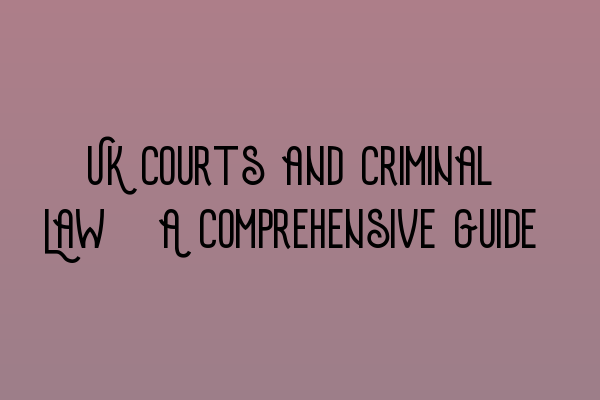UK Courts and Criminal Law: A Comprehensive Guide
Welcome to SQE Criminal Law & Practice Law UK! In this comprehensive guide, we will take you through the intricacies of the UK courts and criminal law system. Whether you’re a law student, legal professional, or simply interested in understanding the criminal justice process in the UK, this guide will provide you with valuable insights.
To begin, let’s explore the various levels of courts in the UK. The judicial system in the UK is structured hierarchically, with different courts handling different types of cases at different levels of severity. From the lowest to the highest, the courts include the Magistrates’ Court, Crown Court, Court of Appeal, and Supreme Court. Each court has its unique jurisdiction and responsibilities, ensuring a fair and efficient judicial process.
The Magistrates’ Court is the first level of court in the UK, dealing with minor offenses and low-level criminal cases. It is presided over by a magistrate or a panel of magistrates. However, more serious criminal cases are referred to the Crown Court, which has the authority to impose longer sentences and handle complex trials.
Moving up the hierarchy, we have the Court of Appeal, which hears appeals from decisions made in the lower courts. This court focuses on matters of law rather than fact and plays a crucial role in maintaining consistency and coherence in the UK legal system. Finally, we have the Supreme Court, which is the highest court of appeal for both criminal and civil cases. It deals with matters of significant public importance, setting legal precedents for future cases.
Now let’s delve deeper into the criminal law process in the UK. At its core, the criminal justice system aims to hold individuals accountable for criminal actions and maintain societal order. Key stages of the criminal law process include arrest, charge, bail, trial, and sentencing. Each stage requires careful consideration of evidence, legal arguments, and fair trial rights.
One essential aspect of criminal law is the burden of proof. In a criminal case, the burden of proof lies with the prosecution, who must prove beyond a reasonable doubt that the accused committed the crime. This high standard ensures that no innocent person is wrongfully convicted. It is important to note that legal representation is essential during these proceedings.
If you’re pursuing a career in criminal law, it is vital to understand the different roles within the criminal justice system. These roles include solicitors, barristers, judges, and legal support staff. Solicitors are the first point of contact for clients, providing legal advice, handling paperwork, and conducting research. Barristers, on the other hand, specialize in courtroom advocacy and represent clients during trials.
In addition to mastering the legal aspects, it is crucial to stay up-to-date with recent developments in criminal law. As the legal landscape evolves, keeping abreast of new legislation, case law, and procedural changes is essential. It’s worth mentioning that SQE 1 Practice Exam Questions and SQE 1 Practice Mocks FLK1 FLK2 can help you prepare for the SQE exams, while SQE 2 Preparation Courses and SQE 1 Preparation Courses can assist you in gaining the necessary knowledge and skills to succeed in your legal career.
Finally, it is important to be aware of important dates such as SRA SQE Exam Dates. These dates will help you plan your exam preparation and ensure you’re fully prepared for your assessments.
We hope this guide has provided a comprehensive overview of the UK courts and criminal law system. Remember, a strong foundation in criminal law is key to success in this field. If you have any further questions or require legal assistance, please don’t hesitate to reach out to us at SQE Criminal Law & Practice Law UK.
